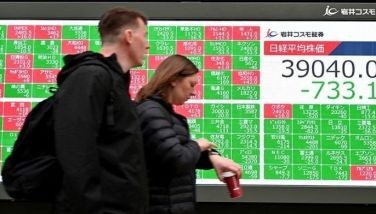Curve balls keep coming
Geopolitical curve balls keep on coming, making it harder to project how the global and our local economy will perform in the months to come.
Just when we thought that we could finally plan for the second half of the year and interest rates could ease up to allow entrepreneurs to finally seek capital to restart their small businesses, geopolitical risks have been stirred up anew by the unexpected missile exchange between Israel and Iran, even as the Israel-Gaza conflict continues.
While it may seem that the conflict in the Middle East is too far away and does not involve us, its effect was almost immediate with the peso, along with other emerging market countries’ currencies, experiencing a depreciation.
A weaker peso means that imported cost components of local manufacturers and even imports of finished products would mean more expensive goods when inflation remains a threat and the Philippines remains a net importer of even basic staple commodities such as rice, flour and beef.
With the global economy still largely dependent on imported crude oil, a widening Middle East conflict could negatively impact vital world oil supply and even disrupt vital shipping and air lanes, as demonstrated by the air space closure implemented by Iran immediately following the retaliation by Israel last week.
Hopefully, the tit-for-tat missile exchange, with both parties giving adequate warning about their strikes, will end at that and not escalate further, given that the US Congress may grant additional military aid to Israel and Ukraine after managing to hurdle a House vote.
The siege on Ukraine, a key grain source, had early on affected world markets, resulting in a spike even here in the country on the price of breads, cakes and pastries.
Climate change
Of course, military and political conflicts are not the only curve balls, even climate change has proven that business as usual is not always assured, with the Middle East again at the center of an unusual weather event as unprecedented rain and severe weather disrupted air traffic in the growing and increasingly busy travel hubs of the United Arab Emirates and Qatar.
Our food production, likewise, is also experiencing the effect of climate change, with the increasing summer temperature threatening drought conditions in key rice and food producing areas. Less local production translates to more costly imports.
The heat is such that more and more Filipinos are seeking relief through air conditioning, adding to the stress on the limited budget of most households that already have to deal with rising electricity and water costs.
More and more people are flocking to the air conditioned malls, with restaurants still enjoying brisk business, but retail outlets are mostly bereft of customers and quite a few are offering mid season bargains and sales just to attract some buyers. It is also surprising that game arcades inside malls are a go to destination for some families as there are really very few parks in the city to go to.
Air fares on the rise
Apart from geopolitical factors and climate change, the airline industry is also facing man made problems, specifically Boeing, following a number of highly publicized “defects” of Boeing aircraft and an ongoing US Congressional hearing following allegations of attempts by the US aircraft manufacturer to hide its shoddy workmanship.
The airline industry, thus, faces increasing demand with limited production and leaving European aircraft manufacturer Airbus to meet the additional demand for new airplanes.
Thus, those who have to travel and are still intent on traveling, face higher air fares.
World Bank weighs in
No less than World Bank’s Development Committee chairperson, Mohamed bin Hadi Al Hussaini of the United Arab Emirates, affirmed that “situations have significant impacts on the global economy,” and that “today’s era must not be of war and conflict.”
In a statement released by the World Bank, Hussaini acknowledged that: “Global economic conditions in the past year were better than expected. Fears of global recession have faded, and inflation has moderated. However, global economic prospects remain subdued. In many developing countries, the post-pandemic recovery continues to be weak, aggravating economic and social stresses and inequality, negatively affecting the global economy and the most vulnerable and further eroding hard-won development gains. Many developing countries also face heavy debt burdens and constrained fiscal space. This leaves limited resources to support basic services, such as functioning healthcare systems, food and nutrition security, quality education, social protection, and clean water and energy and makes it harder to build resilience to global challenges like climate change, pandemics and fragility. Climate change and biodiversity loss add pressure by exacerbating instability, shocks, forced displacement and migration and the loss of human capital.”
Thus, Hussaini warned, “Immediate action is needed to address these multiple intertwined crises if the world is to eradicate poverty and reduce the inequality affecting many clients, including those in small states, while addressing the root causes of fragility, conflict and violence (FCV). It is imperative that the global community work together to ensure that no one is left behind in pursuit of a more sustainable, inclusive and resilient world. The Development Committee’s commitment to ending extreme poverty and boosting shared prosperity on a livable planet in support of the Sustainable Development Goals remains firm. Governors urged the World Bank Group and the International Monetary Fund to continue to work in partnership with the development community to help bolster the delivery of finance and essential services to the poor and most vulnerable. They called on WBG management to continue to enhance the institution’s effectiveness in helping countries address the drivers and impacts of FCV, in coordination with development and humanitarian partners.”
While recognizing the Development Committee is not the forum to resolve geopolitical and security issues and these issues will be discussed in other fora, Development Committee members acknowledged that these situations have significant impacts on the global economy. Today’s era must not be of war and conflict.
- Latest
- Trending























